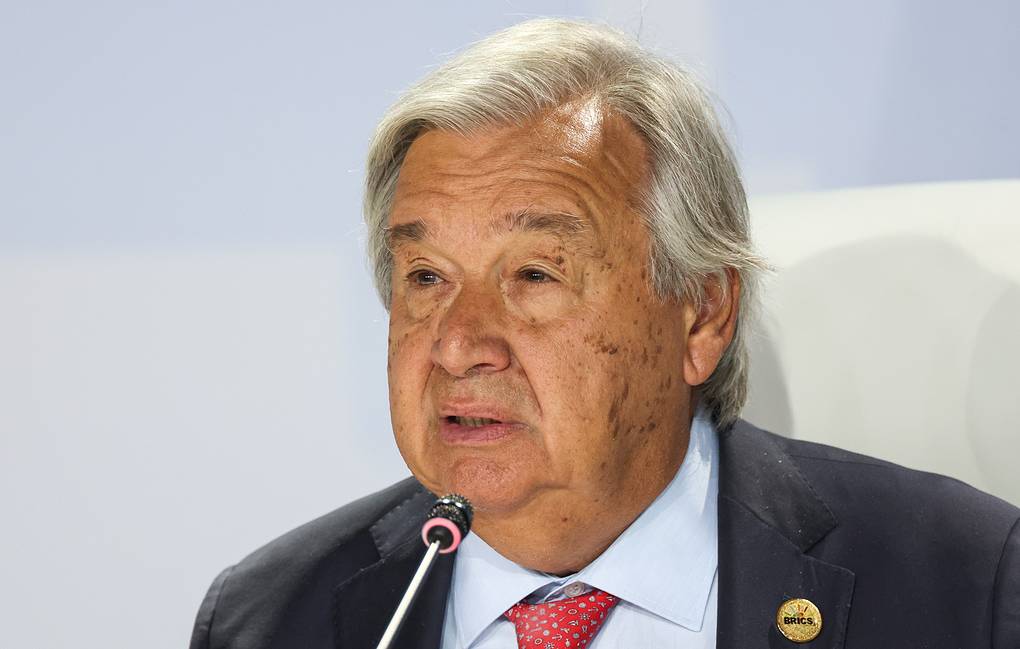
UNITED NATIONS, Sept 14 (NNN-AGENCIES) — UN Secretary-General Antonio Guterres will discuss the renewal of the grain deal with Russian Foreign Minister Sergey Lavrov, as well as with presidents of Turkiye and Ukraine Tayyip Erdogan and Vladimir Zelensky next week.
The discussions will be held at personal meetings as part of the high-level week of the UN General Assembly.
“Next week, I will be receiving president Zelensky I will be receiving president Erdogan I will be receiving minister Lavrov and obviously, this question will be on the table of our discussions,” he told a press conference responding to a relevant question.
Guterres noted that he will hold separate contacts with representatives of the Russian Federation, Ukraine and Turkey and does not plan to gather them together.
“I remained determined to do everything possible to establish the Black Sea initiative, the exports of Ukraine foodstuffs, and also to go on our work in relation to the facilitation within the sanctions regime of the Russian foods and fertilizer products,” he added.
The UN General Assembly High-level Week will take place Sept 19-23 in New York. The Russian delegation will be headed by Sergey Lavrov.
On July 17, Russia refused to continue its participation in the grain deal, which was reached a year ago to ensure safe exports of Ukrainian grain across the Black Sea. President Vladimir Putin stated that none of the terms of the deal regarding the removal of sanctions from Russian exports of grain and fertilizers to world markets had been fulfilled.
He repeatedly pointed out that the West exported most of Ukrainian grain to its own states, while the main task of the agreement – supplies to countries in need – was never fulfilled. Nevertheless, Moscow stated that it was ready to immediately return to the deal, once its part that concerns Russia is implemented.
It is in the interest of everybody to have a global compromise, Guterres told the press conference.
“My appeal to world leaders will be clear,” Guterres said. “This is not a time for posturing or positioning. This is not a time for indifference or indecision. This is a time to come together for real, practical solutions. It is time for compromise for a better tomorrow.”
“Politics is compromise. Diplomacy is compromise. Effective leadership is compromise,” he added.
The high-level week is a one-of-a-kind moment each year for leaders from every corner of the globe to not only assess the state of the world, but to act for the common good, he said, stressing that “action is what the world needs now.”)
The world leaders are gathering at a time when humanity faces huge challenges, from the worsening climate emergency to escalating conflicts, the global cost-of-living crisis, soaring inequalities and dramatic technological disruptions, said Guterres.
“People are looking to their leaders for a way out of this mess. Yet in the face of all this and more, geopolitical divisions are undermining our capacity to respond,” he said.
A multipolar world is emerging. While multipolarity can be a factor of equilibrium, it can also lead to escalating tensions, fragmentation and worse, Guterres noted.
“But at a time when our challenges are more connected than ever, the outcome of a zero-sum game is that everyone gets zero,” he said.
The UN chief told reporters that although there are divisions, different interests, different visions and different cultures, the world needs compromise.
“If we want a future of peace and prosperity based on equity and solidarity, leaders have a special responsibility to achieve compromise in designing our common future for our common good,” he said. “Next week here in New York is the place to start.”– NNN-AGENCIES






